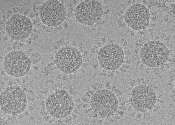Toxoplasmosis: Researchers identify protein that evolved alongside infection machinery
Toxoplasmosis is an infectious disease found worldwide, caused by the single-celled parasite Toxoplasma gondii. In humans, infection poses a particular risk to pregnant women, as it can lead to birth defects. Like the closely ...









